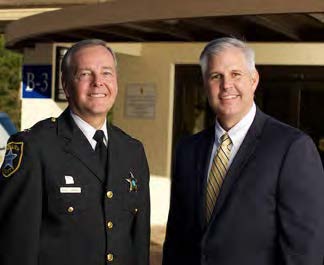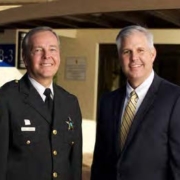Collaborative Effort to Combat Opioid Addiction

Sheriff Rambosk and Scott Burgess
The Collier County Community and Human Services Division, Collier County Sheriff ’s Office (CCSO), and the non-profit David Lawrence Centers for Behavioral Health (DLC), have partnered in a three-year Criminal Justice, Mental Health, and Substance Abuse (CJMHSA) Reinvestment grant awarded by the State of Florida Department of Children and Families in the amount of $1,200,000.
The grant includes a$1,200,000 match and will fund Medication-Assisted Treatment (MAT) in the County Jail. MAT is the use of Food and Drug Administration-approved medications such as methadone, buprenorphine or naltrexone to treat opioid use disorders. In combination with counseling, behavioral therapies and recovery support, MAT is the gold standard for treating opioid use disorders and can help sustain recovery.
“The National Council for Mental Wellness reports that persons who are incarcerated are approximately 100 times more likely to die by overdose in the first two weeks after their release compared to the general public.”
Individuals returning to the community after incarceration face a myriad of challenges including: securing stable housing; obtaining employment and a stable source of income; complying with community supervision requirements; accessing transportation; and rebuilding social connections. When these needs go unmet, the likelihood of accessing and remaining on MAT in the community diminishes.
Nancy Dauphinais, DLC Chief Operating Officer, said, “Though relapse is a common and expected step on the path to sustained recovery, it can also be life-threatening, raising the risk of a fatal overdose. Providing access to MAT is a significant step forward to ensuring life-saving and life-changing treatments are available for individuals that have opioid use disorders.”
The new Jail MAT Program will provide a comprehensive jail to-community network of resources and treatment, to create more successful outcomes for individuals with substance use and cooccurring disorders within the criminal justice system.
A dedicated MAT team of jail and community-based staff members will assist those being released for a safer and more successful transition into the community after release.
CCSO will receive $845,280 of the grant and match $929,399 to fund the necessary nursing staff and medications for the delivery of MAT services to inmates arrested while on MAT, within the County jail. Program staff will screen for MAT eligibility, administer and monitor medicated treatment within the jail, and provide discharge planning and treatment referrals to participants.
DLC will receive $261,467of the grant and match $259,738 to provide care coordination, case management, and peer recovery support coaching, in addition to the cost of medications after release, incidentals, and project evaluation.
Upon release, program participants will be linked with DLC’s treatment and recovery support to continue MAT and ongoing supportive recovery services. DLC will provide case management services to ensure basic needs are met, establish the inmates’ follow-up appointments with treatment providers, and ensure continuity of care for three consecutive months following their release from jail.
The DLCMAT Peer Recovery Specialist utilizes their lived experience with addiction to help others achieve and maintain recovery and wellness. They provide recovery support, advocacy, mentoring and assistance with coordination of services, which can include transportation to treatment and follow-up care.
“Our piece is to be the bridge for when an inmate is released so they can continue with the treatment services and return to being healthy, productive members of society,” Dauphinais added. “Proper treatment of substance addiction reduces drug related crime and referrals of children to the child welfare system.
Recovery can impact all functions of the community from crime to health to the economy and industry.”
Increasing the use of evidence-based practices for treatment of addiction and increasing the capacity and effectiveness of the justice system response for persons experiencing serious mental illness and/or substance use disorders is outlined in Collier County’s new five-year strategic plan for mental health and addiction services.
The plan serves as a road map for community partners, donors and government leaders as they mobilize responses to address associated current and future challenges.
“COVID has had a significant and deadly impact on those struggling with addiction and a worsening of the drug overdose epidemic in the United States,” said Dauphinais. “We feel very fortunate to have received this grant and are confident it will save lives, reduce crime and help alleviate demand on an over burdened healthcare system.”
DLC is Collier County’s only comprehensive, non-profit behavioral health provider serving children, adults and families. To ensure everyone in need can access DLC’s life-saving inpatient, residential, outpatient and community-based care, donate at DavidLawrenceCenters.org.
Disclaimer: Program sponsored by The State of Florida, Department of Children and Families and Collier County Community and Human Services Division.




Leave a Reply
Want to join the discussion?Feel free to contribute!